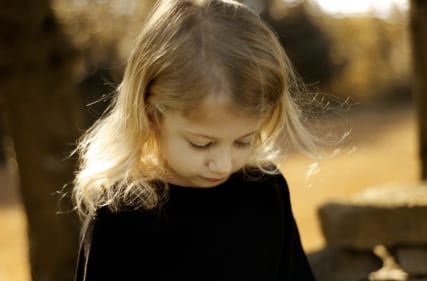Death is a hard concept for adults to grasp and it produces a range of emotions that leaves many confused, sad and angry. The impact of losing loved ones has a similar, and sometimes stronger, impact on children, so it’s important for parents to step in and help their children deal with the death of close loved one. Whether your child loses a friend, relative, teacher or beloved pet, communication and open discussions are key to helping your child get through this difficult time.
Find Out What They Know
Discuss with your child what she thinks about death and find out how she feels about the loss of the loved one. Children’s thoughts on the subject may vary by age and may depend on whether they’ve dealt with the death of a loved one before. Previous knowledge about death from lessons in school, at home or through conversations with friends can also affect their view. Younger children may simply view death as someone sleeping, without a clear understanding that their loved one won’t wake up.
Be Simple and Honest
Explain the definition of death to your child in simple, but honest terms. Kid’s Health, an online resource for parents, notes that parents can explain death to younger children by saying that the loved one’s body stopped working because of a severe illness, an accident, homicide, suicide or old age. Explain any terms your child might not know, and be prepared to answer any of his questions.
Lasting Memories
Inform your child that the loved one will not return, but she can think of all the fond memories she has of the person when she misses him.
Discuss Mourning Process
Discuss the mourning process and common feelings people have when deaths occur. Explain emotions commonly associated with death such as sadness, anger, guilt and fear. Let your child know how you feel about what has happened.
Funeral Attendance?
Decide whether you think your child should attend the funeral of your loved one. Ask your child if he’s interested in attending the services and don’t force him to go if he doesn’t want to. Healthy Place, a website dedicated to mental health, suggests letting children participate in any gatherings and ceremonies they want to after the death of a loved one.
Prepare for the Ceremony
Prepare your child in advance for the ceremony, detailing whether the body will be in a casket, cremated or handled in some other manner, based on the family’s spiritual and religious beliefs. Discuss different ways people may grieve at the funeral, including crying and showing sad faces.
Make Prior Arrangements
Prepare to leave the funeral with your child if she becomes too upset by the ceremony, or do as Kid’s Health suggests and get another adult to care for your child if she needs to leave the funeral–or in case you become too upset during the services.
A Picture Says a Thousand Words
Encourage your child to draw pictures to express how he’s feeling or to come to you for a hug or to talk when he thinks about the death of your loved one. Give your child a picture of your loved one, or a picture of him and your loved one, for memories.





